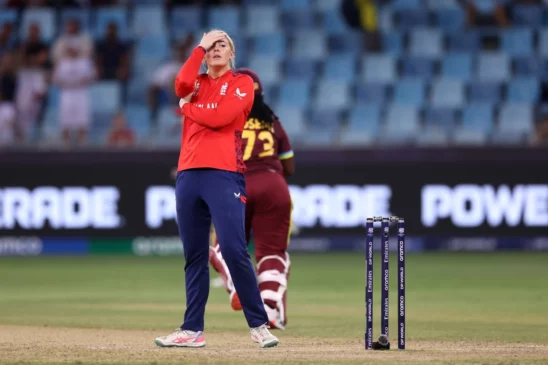Table of Contents
England‘s shocking exit from the Women’s T20 World Cup 2024 has left fans and analysts reeling. After a series of promising performances, the team faltered dramatically against the West Indies, leading to their elimination from the tournament. Here are three critical reasons behind this unexpected downfall.
England’s over-reliance on Natalie Sciver-Brunt

One of the most glaring issues for England was their over-dependency on Natalie Sciver-Brunt. In a match where England scored a mere 141 runs, Sciver-Brunt contributed a significant 57 not out, showcasing her talent and resilience. However, the rest of the batting lineup failed to support her adequately, with key players like Danielle Wyatt-Hodge and Maia Bouchier falling cheaply. This lack of depth in batting highlighted a concerning trend: when Sciver-Brunt was not able to perform at her best, the entire team struggled to find momentum or build a competitive total. Such reliance on one player can be detrimental in high-stakes matches, as it places undue pressure on that individual while leaving others untested in crucial situations.
Sloppy fielding costs crucial runs for the English

Fielding is often the unsung hero of cricket matches, and England’s performance in this department was far from stellar. The team exhibited sloppy fielding, committing several errors that proved costly. Frequently dropped catches and miss-fields allowed the West Indies to capitalize on scoring opportunities, if in retrospect we look into the game West Indies batter Qiana Joseph was dropped five times and skipper Hayley Matthews once, ultimately leading to an easy chase of 142 runs.
England’s inability to execute basic fielding skills not only demoralized the team but also shifted momentum firmly in favour of their opponents. Such lapses in concentration can be game-changing, especially in a knockout tournament where every run counts.
Also READ: 3 key reasons behind Team India’s early exit from Women’s T20 World Cup 2024
Inconsistent strategy and execution against the opponents

Finally, England’s inconsistent strategy and execution throughout the tournament contributed significantly to their early exit. The team’s approach appeared reactive rather than proactive, failing to adapt to the conditions or the strengths of their opponents effectively. For instance, despite having a solid bowling attack, they struggled to contain the West Indies’ opening partnership, which amassed 102 runs without losing a wicket. This lack of strategic foresight revealed a fundamental flaw in their game plan, as they seemed unable to adjust their tactics based on real-time developments during matches.
England’s exit from the Women’s T20 World Cup 2024 can be attributed to an over-reliance on individual performances, poor fielding standards, and inconsistent strategic execution. As they regroup and reflect on this disappointing campaign, addressing these issues will be crucial for future success in international cricket.
Also READ: West Indies edge past England to reach the semifinals of the Women’s T20 World Cup 2024
This article was first published at WomenCricket.com, a Cricket Times company.
